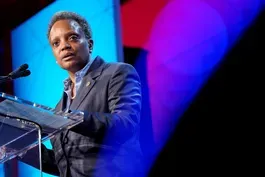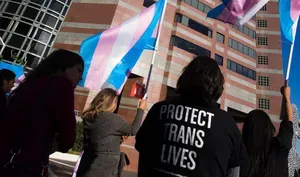
'Very unlikely' adversary caused Havana Syndrome, U.S. says
Clip: 3/1/2023 | 6m 20sVideo has Closed Captions
'Very unlikely' foreign adversary caused Havana Syndrome, U.S. intelligence says
It is a mystery that has challenged the U.S.’s intelligence community for years. The unexplained illness known as Havana Syndrome, named after the city where diplomats and intelligence officials first suffered from dizziness, cognitive difficulties and even memory loss. Wednesday, the intelligence community assessed it was likely not the work of a foreign adversary. Nick Schifrin reports.
Problems with Closed Captions? Closed Captioning Feedback
Problems with Closed Captions? Closed Captioning Feedback
Major corporate funding for the PBS News Hour is provided by BDO, BNSF, Consumer Cellular, American Cruise Lines, and Raymond James. Funding for the PBS NewsHour Weekend is provided by...

'Very unlikely' adversary caused Havana Syndrome, U.S. says
Clip: 3/1/2023 | 6m 20sVideo has Closed Captions
It is a mystery that has challenged the U.S.’s intelligence community for years. The unexplained illness known as Havana Syndrome, named after the city where diplomats and intelligence officials first suffered from dizziness, cognitive difficulties and even memory loss. Wednesday, the intelligence community assessed it was likely not the work of a foreign adversary. Nick Schifrin reports.
Problems with Closed Captions? Closed Captioning Feedback
How to Watch PBS News Hour
PBS News Hour is available to stream on pbs.org and the free PBS App, available on iPhone, Apple TV, Android TV, Android smartphones, Amazon Fire TV, Amazon Fire Tablet, Roku, Samsung Smart TV, and Vizio.
Providing Support for PBS.org
Learn Moreabout PBS online sponsorshipAMNA NAWAZ: Welcome to the "NewsHour."
It is a mystery that has challenged the country's intelligence community for years.
GEOFF BENNETT: Fifteen hundred reports of an unexplained illness known as the Havana Syndrome, named after the city where U.S. diplomats and intelligence officials first suffered from dizziness, cognitive difficulties, even memory loss.
Today, the intelligence community has assessed it was likely not the work of a foreign adversary.
Nick Schifrin is here with more.
Nick, it's good to see you.
So, what does this assessment say?
NICK SCHIFRIN: It -- the top line is exactly what you just said, that the members of the intelligence community participating in this found it -- quote -- "very unlikely" a foreign adversary was responsible, very unlikely a weapon or any device purposely or accidentally caused the symptoms.
And there's not even a consistent set of physical injuries that could be characterized as Havana Syndrome.
Now, there are varying levels of confidence, and not the entire intelligence community participated in this.
But, for the I.C., this is as emphatic a conclusion as it makes on serious conditions that we're talking about that Americans suffered in Cuba, in China, Americans who worked on Russia, even the U.S. officials who suffered this here in the United States.
But one official told us today: "We cannot tie a foreign adversary to any of those incidents."
GEOFF BENNETT: So, what evidence does the intelligence community provide to back that up?
NICK SCHIFRIN: The intelligence briefers who talked to me and about a dozen reporters today, one official said intelligence points against, against foreign involvement.
And this official said that adversaries, including China and Russia, expressed some confusion when the U.S. started reporting Havana symptoms.
Many thought this was a U.S. plot to blame them for something.
There was no evidence, this official went on to say, that Ukrainians or any kind of partner country suffered from any systematic attack or any evidence that an adversary was even practicing this kind of attack, again, evidence that they would have seen if they believed an adversary was behind this.
As for the weapon, previous assessments that the intelligence community has considered said that directed energy might have caused these symptoms.
The intelligence official told us -- quote -- "Those were all washed out."
There was no evidence, this official said, that any adversary overcame some of the challenges to create some kind of microwave, for example, that would have, this official said, had to have gone through concrete or had line of sight to some of these victims.
But I just spoke with the head of the intelligence community experts panel, David Relman, and he disagreed.
He said that the panel found that a device could have been portable, concealable, and there could have been more than one mechanism used.
And he said, look, the U.S. simply doesn't know enough about directed energy to know for certain whether it could have been used or not in this case.
GEOFF BENNETT: Wow.
So, if we're to take this assessment at face value, if not a foreign adversary with a weapon, what then explains the symptoms that these people have come forward with, 1,500 reports across 96 countries?
NICK SCHIFRIN: Yes, it's a great question, for which the intelligence community does not have a great answer.
The officials who we spoke to briefed on a couple of possibilities for what the victims suffered from.
They talked about environmental circumstances.
One official even talked about a malfunctioning air conditioner that created undue pressure in a room.
The official talked about preexisting medical conditions, what they called conventional illness, in some of these cases, and social forces, otherwise known as, frankly, media attention, causing more people to report what they suffered.
But that has not ameliorated what the victims felt.
I talked to multiple former officials today who made the same point; 26 Americans and Canadians in Havana at the same time felt symptoms, and there were no preexisting medical conditions among them, nor was there coordination between them when they suffered, these victims.
And we talked to attorney Mark Zaid, who represents a couple of dozen of these victims and their families.
He said -- quote -- "They were demoralized by these findings, and they disagree with them."
MARK ZAID, Attorney For Havana Syndrome Victims: There are counterintelligence situations that have arised with respect to surveillance and interactions with human individuals with respect to our intelligence officers that haven't been investigated.
There are technical situations where electronic devices have started to act strangely in the midst of what the human individual interprets to be an AHI incident.
There is absolutely no doubt that our foreign adversaries are very capable of doing this.
In fact, the technology, frankly, was created by the United States, for the most, part back five, six decades ago.
NICK SCHIFRIN: AHI incident is an anomalous health incident.
That's what we call the Havana Syndrome.
The intelligence officials I spoke to today responded to some of those criticisms and said that they did track down every lead, including the ones that Zaid pointed out, in an investigation they compared to the Osama bin Laden hunt, before coming to their conclusions.
As for the victims feeling rejected by today's assessment, CIA Director Bill Burns, Director of National Intelligence Avril Haines, all released statements saying the same thing, that they believe the victims' pain was real.
And that was echoed today by the State Department spokesman, Ned Price.
NED PRICE, State Department Spokesman: The findings that the intelligence community has spoken to today in no way call into question the experiences, the symptoms that our colleagues and their family members have reported in recent years.
NICK SCHIFRIN: And so while the victims do say their medical care has improved in the last few years, and whether or not they get -- receive care is independent of today's assessment, they clearly believe that they were still a target of a foreign adversary, and they are very upset by today's findings.
GEOFF BENNETT: Nick Schifrin, thanks so much for that reporting.
Appreciate it.
Arizona Republican turns to art after political career ends
Video has Closed Captions
Clip: 3/1/2023 | 3m 28s | Republican who opposed 2020 election lies finds time for art after political career ends (3m 28s)
Climate change and the risk of spreading diseases
Video has Closed Captions
Clip: 3/1/2023 | 7m 37s | Is climate change accelerating the risk of disease spreading from animals to humans? (7m 37s)
News Wrap: Chicago voters oust mayor with crime a top issue
Video has Closed Captions
Clip: 3/1/2023 | 5m 55s | News Wrap: Chicago voters oust mayor in election where crime was a top issue (5m 55s)
Parents concerned as new laws target transgender children
Video has Closed Captions
Clip: 3/1/2023 | 11m 3s | Parents concerned as new state laws restrict rights of transgender children (11m 3s)
Pharmaceutical giant slashes insulin prices after pressure
Video has Closed Captions
Clip: 3/1/2023 | 5m 12s | Pharmaceutical giant slashes insulin prices after pressure from government and consumers (5m 12s)
Ruling party candidate wins Nigeria's presidency
Video has Closed Captions
Clip: 3/1/2023 | 5m 23s | Ruling party candidate wins Nigeria's presidency after disputed vote (5m 23s)
Providing Support for PBS.org
Learn Moreabout PBS online sponsorshipSupport for PBS provided by:
Major corporate funding for the PBS News Hour is provided by BDO, BNSF, Consumer Cellular, American Cruise Lines, and Raymond James. Funding for the PBS NewsHour Weekend is provided by...
















